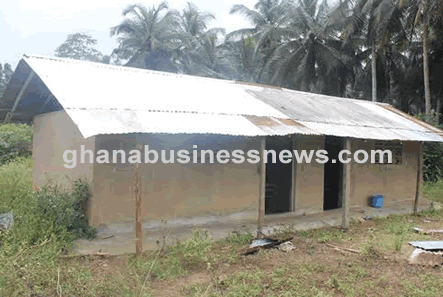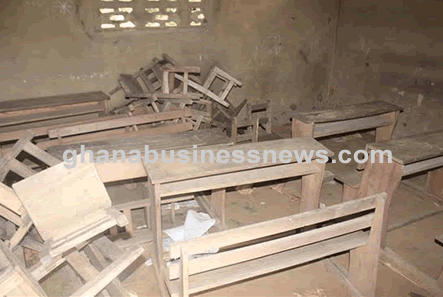Miekyina, a community with no school, electricity nor hospital
 Miekyina is a small community in the Jomoro constituency in the Western Region of Ghana. It has a population of about 241 people. The word “Miekyina” means “let us stop” in the Nzema dialect. It is believed that, during the Gold Coast era, the Nzema king at that time was very wicked to his people and the British colonial rulers decided to capture him.
Miekyina is a small community in the Jomoro constituency in the Western Region of Ghana. It has a population of about 241 people. The word “Miekyina” means “let us stop” in the Nzema dialect. It is believed that, during the Gold Coast era, the Nzema king at that time was very wicked to his people and the British colonial rulers decided to capture him.
During the search for him by the British soldiers, the king was running and at a point he got tired so he told his people in the Nzema, “miekyina”.
While they stopped to rest for a while, the British soldiers captured him and the place he was captured was named “Miekyina”
About a week ago, a report by GHone TV, revealed the deplorable state in the small community of Miekyina.
So I decided to visit the community with a friend who works on a project called, “Save One Child Project.”
The project seeks to reach out to deprived communities in Ghana.
We set off at dawn, exactly at 3:00am and arrived at 9:00 am in a small town called Mpataba to pick my uncle (Nyameke), who will lead us to Miekyina as it was our first journey to the town. When we arrived at Beyin town at 9:30 am, we were told we can only get to Miekyina on a motor bike because of the impassable nature of the road.
We hired two motor bikes locally called, “Okada.”
The journey turned into a bit of sight-seeing as we enjoyed the beautiful scenery, green vegetation and thick forest.
As we enjoyed the beautiful scenery our minds still focused on our mission – to see at first hand the state of the  community and the only school as presented by the TV news and also see how best we could bring life to the community and revive the school.
community and the only school as presented by the TV news and also see how best we could bring life to the community and revive the school.
As we chit-chatted with the motor rider about the reason behind our journey, which was to revive the defunct school, the motor rider, disclosed that he was a teacher in the school.
This presented an opportunity for us to get the details of what led to the collapse of the school whilst we interviewed him.
When we got to our destination, the chiefs and the people were ready to welcome us, as my uncle had already informed them about our visit.
We had interaction with the chiefs and the elders about the school and our intentions of reviving it. They appreciated our effort and expressed hope that our visit will yield a positive result for the school.
They took us to the abandoned school building to witness it ourselves.
The school was only one small building divided into two classrooms.
According to Nicholas Blay, the teacher of the school, parents could not afford GH¢1 for their wards leading to the collapse of the school.
The roofing of the school was scattered around, broken and rusted, probably from sunshine and rain.
The school has been abandoned for one and a half year, and obviously the classrooms were covered in thick dirt, broken chairs and tables were everywhere. Weeds have virtually found a new home in the school.
Given the deplorable state of the only school in the community, school children have to depend on a school in a town nearby, Benyin.
They have to walk three and half miles each day to Benyin to access education, which obviously is too much a burden for the children.
Although the community seemed hopeless, the children seemed so excited to see us. The level of excitement assumed even a higher dimension as we took our camera to take pictures with them.
If a flash of a camera could cause such an excitement and a sense of hope, how much more the gift of a renovated and functional school?
Other social amenities lacking in the community are potable drinking water, electricity and a health centre.
In times of health crisis, they have to travel to a nearby town called Kabaku.
An elder noted that most of the young people have migrated to urban areas because electricity is not available.
“They have all gone to where electricity is available, so they can enjoy good life,” he said.
The Miekyina community, obviously have not received their share of the national cake as the community is deprived of all the things that make life worth living – roads, schools, health centres, electricity among others.
If the government has failed the people of Miekyina, what can individuals do to help and more importantly to secure the future of the children there.
Mother Teresa once said, “Do things for people not because of who they are or what they do in return, but because of who you are.”
By Francis Quasie
Email: [email protected]
